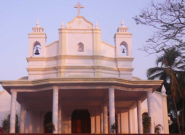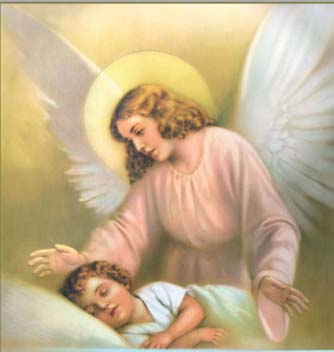
The Guardian Angel

The Guardian Angel is an angel that is assigned to protect and guide a particular person, group, kingdom, or country. Belief in guardian angels can be traced throughout all antiquity. The concept of tutelary angels and their hierarchy was extensively developed in Christianity in the 5th century by Pseudo-Dionysius the Areopagite.
The theology of angels and tutelary spirits has undergone many refinements since the 5th century. Belief in both the East and the West is that guardian angels serve to protect whichever person God assigns them to, and present prayer to God on that person’s behalf.
The Guardian Angel concept is clearly present in the books of the Hebrew Bible and the Old Testament, and its development is well marked. These books conceived of God’s angels as his ministers who carried out his behests, and who were at times given special commissions, regarding men and mundane affairs.
In Genesis 18-19, angels not only act as the executors of God’s wrath against the cities of the plain, but they deliver Lot from danger; in Exodus 32:34, God says to Moses: “my angel shall go before thee.” At a much later period we have the story of Tobias, which might serve for a commentary on the words of Psalm 91:11: “For he will command his angels concerning you to guard you in all your ways;” (Cf. Psalm 33:8 and 34:5)
The belief that angels can be guides and intercessors for men can be found in Job 33:23-6, and in the Daniel 10:13 angels seem to be assigned to certain countries. In this latter case, the “prince of the kingdom of Persia” contends with Gabriel. The same verse mentions “Michael, one of the chief princes”.
In the New Testament the concept of The Guardian Angel may be noted. Angels are everywhere the intermediaries between God and man; and Christ set a seal upon the Old Testament teaching: “See that you despise not one of these little ones: for I say to you, that their angels in heaven always see the face of my Father who is in heaven.” (Matthew 18:10). A twofold aspect of the doctrine is here put forth: even little children have guardian angels, and these same angels lose not the vision of God by the fact that they have a mission to fulfill on earth.
Other examples in the New Testament are the angel who succoured Christ in the garden, and the angel who delivered St. Peter from prison. In Acts 12:12-15, after Peter had been escorted out of prison by an angel, he went to the home of “Mary the mother of John, also called Mark”. The servant girl, Rhoda, recognized his voice and ran back to tell the group that Peter was there. However, the group replied: “It must be his angel”‘ (12:15). With this scriptural sanction, Peter’s angel was the most commonly depicted guardian angel in art, and was normally shown in images of the subject, most famously Raphael‘s fresco of the Deliverance of Saint Peter in the Vatican.
Hebrews 1:14 says: “Are they not all ministering spirits, sent to minister for them, who shall receive the inheritance of salvation?” In this view, the function of the guardian angel is to lead people to the Kingdom of Heaven.
In the New Testament Epistle of Jude, Michael is described as an archangel.
According to Saint Jerome, the concept of guardian angels is in the “mind of the Church”. He stated: “how great the dignity of the soul, since each one has from his birth an angel commissioned to guard it”.[2]
The first Christian theologian to outline a specific scheme for guardian angels was Honorius of Autun in the 12th century. He said that every soul was assigned a guardian angel the moment it was put into a body. Scholastic theologians augmented and ordered the taxonomy of angelic guardians. Thomas Aquinas agreed with Honorius and believed that it was the lowest order of angels who served as guardians, and his view was most successful in popular thought, but Duns Scotus said that any angel is bound by duty and obedience to the Divine Authority to accept the mission to which that angel is assigned. In the 15th century, the Feast of the Guardian Angels was added to the official calendar of Catholic holidays.
In his March 31, 1997 Regina Caeli address, Pope John Paul II referred to the concept of guardian angel and concluded the address with the statement: “Let us invoke the Queen of angels and saints, that she may grant us, supported by our guardian angels, to be authentic witnesses to the Lord’s paschal mystery”.
In his 2014 homily for the Feast of Holy Guardian Angels, Pope Francis told those gathered for daily Mass to be like children who pay attention to their “traveling companion.” “No one journeys alone and no one should think that they are alone,” the Pope said.[8] During the Morning Meditation in the chapel of Santa Marta, the Pope noted that oftentimes, we have the feeling that “I should do this, this is not right, be careful.” This, he said, “is the voice of” our guardian angel…”
“According to Church tradition”, the Pope said, “we all have an angel with us, who guards us…” The Pope instructed each, “Do not rebel, follow his advice!”. The Pope urged that this “doctrine on the angels” not be considered “a little imaginative”. It is rather one of “truth”. It is “what Jesus, what God said: ‘I send an angel before you, to guard you, to accompany you on the way, so you will not make a mistake’”.
Pope Francis concluded with a series of questions so that each one can examine his/her own conscience: “How is my relationship with my guardian angel? Do I listen to him? Do I bid him good day in the morning? Do I tell him: ‘guard me while I sleep?’ Do I speak with him? Do I ask his advice? Is he beside me?”. …Each one of us can do so in order to evaluate “the relationship with this angel that the Lord has sent to guard me and to accompany me on the path, and who always beholds the face of the Father who is in heaven”.
There was an old Irish custom that suggested including in bedtime prayers a request for the Blessed Mother to tell one the name of their guardian angel, and supposedly within a few days one would “know” the name by which they could address their angel. An old Dominican tradition encouraged each novice to give a name to their Guardian Angel so that they could speak to him by name and thus feel closer and more friendly with him.The Congregation for Divine Worship and Discipline of the Sacraments discourages assigning names to angels beyond those revealed in scripture: Michael, Gabriel, and Raphael.
According to Aquinas, “On this road man is threatened by many dangers both from within and without, and therefore as guardians are appointed for men who have to pass by an unsafe road, so an angel is assigned to each man as long as he is a wayfarer.” By means of an angel, God is said to introduce images and suggestions leading a person to do what is right.[13]
Father Giovangiuseppe Califano recounted how, one day, a newly appointed bishop confessed to Pope Saint John XXIII “that he could not sleep at night due to an anxiety which was caused by the responsibility of his office.” “The pope told him, ‘You know, I also thought the same when I was elected pope. But one day, I dreamed about my guardian angel, and it told me not to take everything so seriously.’”[14] Pope John attributed the idea of calling Second Vatican Council to an inspiration from his guardian angel.[15]
Saint Gemma Galgani, a Roman Catholic mystic, stated that she had interacted with and spoken with her guardian angel.[16] Saint Pio of Pietrelcina was known to instruct his parishioners to send him their guardian angel to communicate a trouble or issue to him when they could not travel to get to him or another urgency existed.[17]
The traditional Catholic prayer to The Guardian Angel
Angel of God, my guardian dear
to whom God’s love commits me here.
Ever this day/night be at my side
to light, to guard, to rule and guide.
Amen.
In Latin:
Angele Dei,
qui custos es mei,
me, tibi commissum pietate superna,
illumina, custodi,
rege et guberna.
Amen.[29]